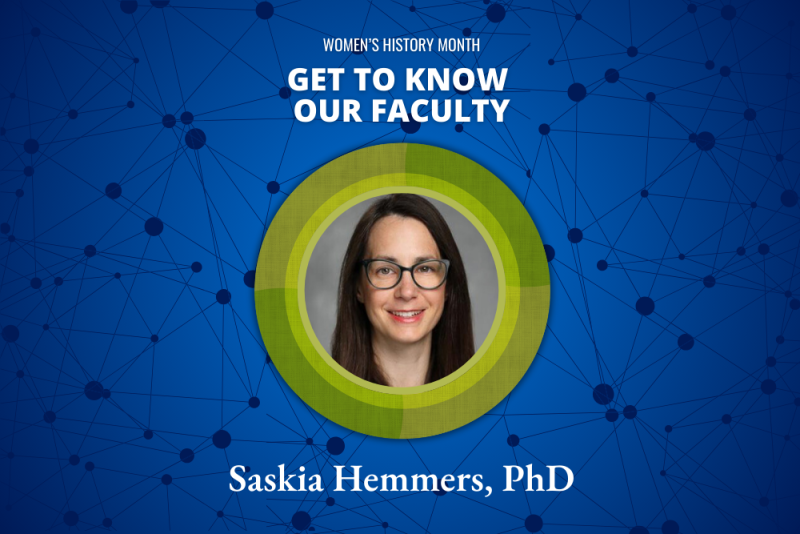
Saskia Hemmers, PhD, is an Assistant Professor in Integrative Immunobiology and also a member of the Duke Cancer Institute.
Briefly describe your upbringing, where you are from, where you went to school
I grew up in a small city in Germany the oldest of three sisters. I did not know anyone that had pursued a career in science but decided to pursue a degree in Biology at the University of Cologne based on my strong interest in chemistry and biology in high school. For my Master’s thesis, I joined a lab that developed novel mouse genetic tools to study fundamental aspects of T cell biology with a particular focus on thymic selection. This was my first exposure to Immunology and set me on my path that ultimately led to IIB.
What inspired you to pursue a career in science and academia?
I am a curiosity-driven person with an analytical mind that is a good a synthesizing complex information down to its essence. I have known that about myself since high school and once I got introduced to the field of immunology during my undergraduate research and Master’s thesis, I had found a place that could continuously feed my curiosity. When I moved to the Scripps Research Institute in La Jolla, CA to pursue my PhD, I found my voice as a scientist and reaffirmed my continued interest in Immunology. I met amazing mentors along the way that encouraged me to make my love for research into a career in academia. As a postdoc at Memorial Sloan Kettering Cancer Center, I found an incredibly stimulating scientific environment that helped me to ask bolder questions and offered training in leadership and mentoring. My passion for science is fueled by seeing the progress that is made in my own lab, in the labs that surround us as well as reading and hearing about novel findings in the broader scientific community. I chose a career in academia as I truly value the privilege to pursue novel ideas while also training the next generation of scientists.
Describe your research interests and the focus of your work?
Since joining the Integrative Immunobiology department, our lab has set out to gain a deeper understanding of how tissue cues affect immune and glial cell behavior. We are a cellular immunology lab that leverages mouse genetic tools in conjunction with high parameter flow cytometry, transcriptomics, imaging, and relevant disease models to achieve our goals. Current projects in the lab are focused on how tissue damage and inflammation shape T cell and glial cell function in the context of neuroinflammation. An additional line of research probes how the cellular ontogeny of T cells contributes to the layered immune system in adulthood.
How do you balance your work and home life?
I try to dedicate some time to non-science related activities that have included political organizing throughout the pandemic, volunteering with organizations that address food insecurity and community clean-up. On a daily basis, I make a concerted effort to dedicate at least 20-30 minutes each day to reading (fiction or non-fiction while having breakfast).
How do you stay updated with developments in your field?
The pace of scientific discovery and technology development is ever increasing, and the data being generated is incredibly complex. Staying on top of relevant discoveries while also surveying larger trends in scientific community is a full-time job. I try to browse major journals on a regular basis utilizing an RSS feed organizer. In addition, attending seminars, meeting with invited speakers, and attending conferences are all great ways to learn about the newest developments in the field as well as great opportunities to build a network of potential collaborators.
How do you foster an inclusive and supportive environment for your lab members or students?
When I started my lab as a new PI, I was very aware of my lack of experience when it came to mentoring. I spend a lot of time reflecting on my experiences as a mentee and seized on opportunities including workshops and lectures on inclusive teaching and mentoring at Duke and beyond.
Part of establishing a safe and inclusive lab culture is through clear communication, active listening, feedback, and regular check-ins (formal and informal). We have developed a lab manual that covers lab relevant information that is provided to all new lab members and is continuously updated based on feedback. Lastly, our stated lab philosophy reflects our commitment to creating a safe and inclusive space that allows us to make exciting discoveries while also continuously growing as human beings.